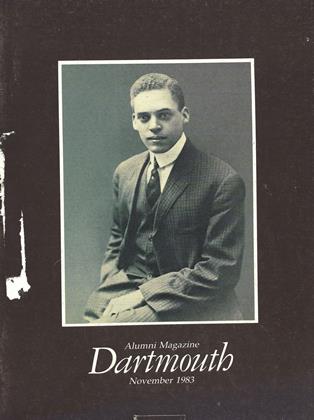DAYS OFF by Paul Nelson '56 University of Virginia Press, 1982, 86 pp., $10.95
Days Off is Paul Nelson's third book of poems, seventh in the prestigious
Associated Writing Programs Award Series in Poetry, sponsored by the Virginia Commonwealth University. This year the competition was judged by William Meredith, who sees in Mr. Nelson's work the "common sense of an uncommonly intelligent man." Here are poems titled "Broadtail Hawk," "Cellars," "Milking," "Wintering the Animals," "Enduring the Thaw," "Shades Down and Porches Empty" subjects as common as one man's day to them. I like it. I may love it: leatherseats, / lumbar adjusted, radials soothing the road. / Semi's snore by, dynastically, on eighteen funereal wheels, /quiet enough beyond the tight window, air conditioning, / Coltrane ontape, whistling like a fish-bird in a rainforest. Mr. Nelson's perceptive faculties are unusual, and the life he writes about palpable. Observe: Low in thefield, on a spring of hardhack, J thehawk rides, big as a half-gallon ofwhiskey. . . . And then, settling for nothing less than accuracy in a further observation: The yellow eyes havespotted my nature: harmless / puttererin grain . . . liar: /1 have killed: pig,deer, chickens, ducks, /goat, mice,geese, rats, steer, snakes, fish, frogs,crabs, trees, and once, a hawk . . .
Without lies or nice dissemblings, life in these poems feels true and quite physical, often to the point of violence one end, after all, of liveliness. We see a boy kick his mongoloid sister inthe back until his glasses fall off; a rabbit shot, one leg kicking the rakedcarcass screwed in the dirt. Lettucedraped the fence. But it's simply as Mr. Nelson says: the gracious curve oftalons completes itself in meat. These poems are about the gracious curve; they are never nasty or horrific for effect, and they give the lie to the notion that gutsy writing had best be brutal.
In poetry as in metallurgy language tough enough to bear its measure of the world's dangers must be cast with great precision. Here Mr. Nelson's at tentive eye what gives us a bat on a window sill like a small purse drawnabout its coins is well served by an attentive ear; the details he notes in natural and emotional landscapes are translated with care and grace into technical detailing in the poems them selves. Though not strictly formal, they demonstrate some of the economies of form, and some of the tricks. Consonants ring against each other here and there: vowels echo back and forth. Rhymes are secreted internally, as a rule, so the tongue catches them before the eye. Occasionally such sound effects are extravagant and good humored listen to this cellar, wherespecks of coal still flicker in the lightthat-smears the tiny window, outsideof which the brilliance of a Buick hubcap buckles my knees. More often, though, it's a subtle matter of sound and diction conspiring toward the kind of deftness that marks good poetry indeed, any sort of good writing.
There's much more to say. Days Off is a true book of poems, not simply a collection of them. The poems knit together delightfully, and not because they're all of a kind. Here rural Maine borders on Mycenae, nature on legend. Greek masks are set down for Adam's, Eve's, for the forms of hawk and fish and cow, of hunter and quarry, of slaughterer and meat. Mr. Nelson slips borders easily. So should we all; it's part of the point of the tales he reminds us of, and much the point of poetry to remind us. Read Days Officii "Hip Boots," "Milking," "Jogger," "April," wonderful poems, by any comparison. More than a sharp record of country life, they are a record of intelligence and sense, in a natural landscape wider than one might suspect, at first — no wider than the world, to think of it. Which is what Mr. Nelson so adroitly encourages us to do.
RICHARD KENNEY '70
Asked for a thumbnail autobiographyRichard Kenney responded, "Live andwrite in Chapel Hill, N.C.? First bookof poems to be released by Yale University Press next spring? Most recentpublications in Poetry (April), Atlantic (June), New Yorker (July)? The thumbnail is probably too expansive a surfacefor the features of this life."
 View Full Issue
View Full Issue
More From This Issue
-
 Feature
Feature"The Greatest Problem in American Biology
November 1983 -
 Feature
FeatureGiving the Rush to the Record books
November 1983 By Brad Hills '65 -
 Feature
FeatureJohn Singer Sargent: Last of the Great Portrait Painters
November 1983 By Richard Stuart Teitz -
 Sports
SportsSports
November 1983 By Kathy Slattery -
 Books
BooksAll Biology Is Indebted . . .
November 1983 By Peter Smith -
 Class Notes
Class Notes1979
November 1983 By Burr Gray
Peter Smith
-
 Letters to the Editor
Letters to the EditorLetters
May/June 2001 -
 Article
ArticleIn the Wide, Wide World
OCTOBER 1981 By Peter Smith -
 Article
ArticleIn the Wide, Wide World
MARCH 1982 By Peter Smith -
 Article
ArticleHooked on Toys
JANUARY/FEBRUARY 1984 By Peter Smith -
 Books
BooksWords of Wisdom
MAY 1984 By Peter Smith -
 Article
ArticleThe Hanover Scene
September 1986 By Peter Smith
Books
-
 Books
BooksTen Introductions a Collection
January 1935 -
 Books
BooksAlumni Articles
JUNE 1970 -
 Books
BooksTHE BEASTS & THE ELDERS.
January 1974 By ALEXANDER G. MEDLICOTT JR. '50 -
 Books
BooksRecord Completed
March 1980 By Charles M. Wiltse -
 Books
BooksCATHOLICISM AND AMERICAN FREEDOM
June 1952 By FRED BERTHOLD JR. '45 -
 Books
BooksPLANTER MANAGEMENT AND CAPITALISM IN ANTE-BELLUM GEORGIA.
July 1954 By W. RANDALL WATERMAN



